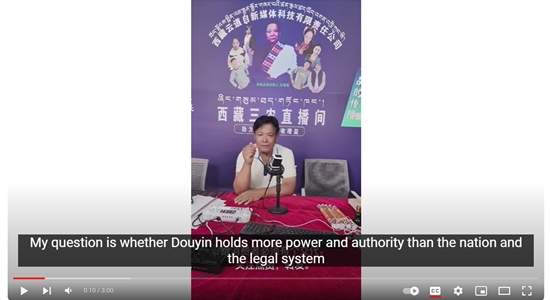
Tibetans have been complaining about China’s leading social media platform, Douyin, which blocks streaming video in which speakers are speaking tne Tibetan language.
It (almost) goes without saying that Douyin is only doing what the Chinese government wants it to do. This government has been working hard, for years, to wipe out the Tibetan language and culture in the name of assimilation. The Chinese state is setting policy and imposing it. Douyin is not giving the party-state its marching orders or acting against what the state wants it to do.
The power of Douyin
But in the headline of a recent report, the International Campaign for Tibet asks: “Inaction, or complicity? Chinese authorities turn a blind eye towards restrictions on Tibetan language.” Which suggests that maybe there’s an open question here (SaveTibet.org, July 24, 2024).
ICT quotes a Tibetan whose video is posted on YouTube. (Although the video itself is not in English, the accompanying transcript, which seems to have been prepared by the Tibetan Centre for Human Rights and Democracy, is in English.)
Today, I want to ask whether our Douyin company holds more power or is it the nation, or whether Douyin company is more powerful than the legal system. Does Douyin company have more power or does the government? What is it?… [O]ur country’s very good policies give protection for a nationality’s cultural preservation and promotion of a nationality’s language. The state really supports these, as does the legal system, and the government, too, supports them. Therefore, why is Douyin company blocking [the livestreaming] in our language when we speak in Tibetan?
The video and another cited by ICT are undated, and the organization says that its sources in Tibet “were not able to confirm whether these videos circulating on social media outside of Tibet are recent or…old postings, as the restrictions on the usage of Tibetan on online Chinese platforms have been in place for years.”
Whatever the date of the video, a bigger apparent mystery is why a Tibetan whose people have been persecuted in many different ways by the Chinese state for many years would pose these questions as if maybe Douyin were independently launching an assault on the Tibetan tongue.
Very…good?
Can the speaker really believe that China has “very good policies,” policies that include “protection for a nationality’s cultural preservation and promotion of a nationality’s language”? Or that the state, government, and legal system “really support these” when they obviously do not, regardless of whatever pretenses may have been incorporated into law codes?
International Campaign for Tibet suggests the most plausible explanation: Tibetans are responding to a pretense with a pretense of their own. They hope to avoid being regarded as critical of the government, which might get them into even more trouble. They also hope that in response to such a carefully nonthreatening appeal—kind of like saying “Nice doggie!” to a canine in process of tearing you apart—the government will after all see fit to abide by is own sometime statements.
Like the statements of Zhao Yong:
At a press conference in Beijing on achievements and measures on ethnic unity and progress in the new era on August 29, 2022, Zhao Yong, then deputy director of the National Ethnic Affairs Commission, defended the Chinese policy of promoting Mandarin maintaining that it does not impact the promotion of non-Chinese languages. In response to a question on China “promoting the use of Mandarin in ethnic minority areas such as Xinjiang and Tibet” might be “detrimental to the development of ethnic minority languages and cultures,” Zhao said, “while popularizing Mandarin in accordance with the law, the Chinese government fully respects and protects the freedom of ethnic minorities to use their own languages, creating conditions for them to learn and use their own languages.”
The year 2022 is way too late in the history of China’s assaults on the Tibetan people, culture, and language for anybody in the Chinese government to be saying honestly that “the Chinese government fully respects and protects the freedom of ethnic minorities to use their own languages, creating conditions for them to learn and use their own languages.”
If Zhao did mean what he said, then he must have been an especially slow-witted stooge of whichever person or persons in the government taught him this, that “the Chinese government fully respects and protects the freedom of ethnic minorities to use their own languages,” etc. A standard modus operandi of the Chinese government is to inflict great evils while saying “Huh? We would never do such a thing.”
Also see:
Official TCHRD: Video: “ ‘Tearful Deluge of a Sorrowful Song,’ performed by Tibetan singer Gegjom”
Radio Free Asia: Video: “Tibetan singer arrested for song criticizing China”





